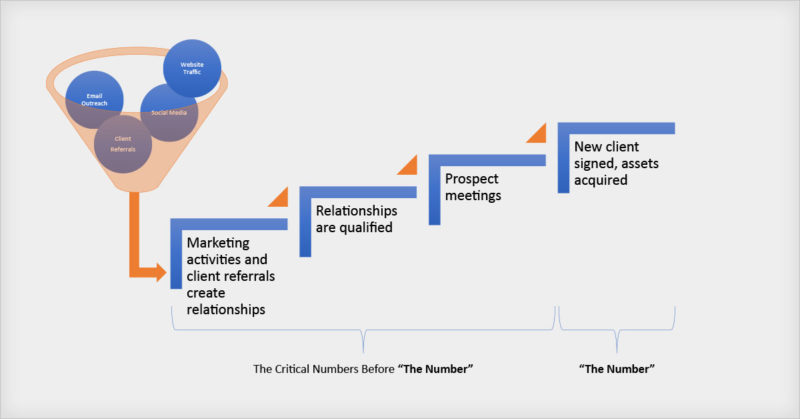We get so focused on AUM that we become blind to what it takes to achieve our growth objectives
The average firm saw 9.2% annual growth between 2011 and 2015, with 75% coming from client referrals [RIA Benchmark Report, Schwab (2016)]. Firm owners, founders, partners and managers face extreme pressure to continue year-over-year growth but lack clarity on how to achieve it beyond practice acquisitions or the client referral channel. Most executives will tell you they see the need to grow their firm’s marketing but lack the confidence to make the necessary investments in marketing activities.
By identifying the numbers before the numbers, we can build accountable marketing programs that drive growth
Many firms I meet with don’t invest in marketing because they lack clarity on how to achieve their AUM growth targets. The key to increasing AUM is one number at a time– but it is likely not the number you expect. By working backward from your goal to increase revenue, your firm can develop a series of critical success factors, key performance indicators, metrics and measurements that will guide your marketing activities and put your growth targets within reach.
We all know that it’s important to add new clients, and that’s easy to measure month over month. Ultimately your goal will be achieved by generating a certain amount of leads and performing the required number of prospect meetings each month. While this may seem like the basics of new client acquisition, many firms fail to effectively track the creation of new relationships within this process. When we peel back the layers of this onion further, we need to identify the numbers before these numbers before we can begin to establish an accountable marketing program.
It is necessary to identify the numbers before the numbers that produce leads and new prospect meetings each month
Before a firm can qualify an individual as a lead, it will need to establish a variety of channels that generate new unqualified relationships each month. By relationships we are referring to basic contact information such as name, email address, phone number, and social profile. With just an individual’s email address, firms can begin the qualification process by communicating directly with that person about a number of different financial planning topics.
The most popular relationship-generating channel is the client referral channel, but it isn’t the only one. As wealth continues to move to next-generation investors, the need to develop additional channels that will generate new relationships will increase. Several of the top relationship generation channels, outside of the client referral channel, include:
- Events, seminars, and webinars
- Websites
- Firm branded portals
- Social media
- Client referrals
- Centers of Influence (COIs)
Let’s take a look at how our number before the numbers approach plays out with your firm’s website
Websites are one of the biggest missed opportunities for many firms in financial marketing today. Every firm has a number of anonymous site visitors each month. The goal is to convert a small portion of anonymous site visitors into new unqualified relationships so that we can nurture them each month.
At this phase we are not focused on whether or not they are qualified leads since lead generation is dependent upon generating enough new relationships to produce a group of qualified leads. While the client referral channel will always remain king, we can enhance AUM acquisition by investing in marketing activities that develop new referral channels such as your firm’s website.
Establish KPIs that help you measure and track the impact of new relationships generated on your website
You have to start someplace, and as Peter Drucker is commonly credited with saying, “What gets measured gets managed.” We know the ultimate goal is to add new clients which comes from establishing a number of new relationships every month. When we shift our focus from leads to new relationships, we can define KPIs around increasing the number of new relationships each month. Later in the process we will need to define KPIs around converting new relationships to leads, leads to prospects, and prospects to AUM, but for now let’s dive deeper into the number before these numbers.
The goal is to drive new relationships, and the critical success factor is to increase the number of new relationships being generated online by 5% next quarter. You must have analytics tracking software on your website to get started with this process since we are going to convert a number of basic measurements into metrics that we can track as KPIs to measure progress quarter over quarter. If you do not have analytics tracking software, Google Analytics is free and it will take your webmaster five minutes to install it for you.
Many firms have Google Analytics data and you can quickly pull out some specific data points to get started. As you move forward and learn, these will change, but let’s start with some basic measurements such as unique website visitors, visits to contact page, visits to blog, and visits to team pages.
Assume you generated 10 new relationships last month via newsletter signup forms, curated financial news via a portal like Vestorly, or contact request forms. If your firm had 1000 unique visitors to its web page last month, 70 visits to the contact page, 200 visits to the blog and 60 visits to the team page, you can establish some initial KPIs to measure the impact of your marketing activities on new relationship generation.
The KPIs would look like:
- 100 unique website visits for every new relationship
- 7 visits to the contact page for every new relationship
- 20 visits to your blog for every new relationship
- 6 visits to your team page for every new relationship
Initially this isn’t going to solve your firm’s digital marketing problems, but over time you will establish a trend line that will help you focus your marketing activities to drive traffic to key sections of your website via emails, social media or paid advertising. In the spirit of “what gets measured gets managed,” get started with some basic KPIs.
Most firms can take the first step today by simply taking the data they have from last month and setting it up in an Excel spreadsheet.
The simple act of getting started with some basic measurements can help to transform your firm’s approach to marketing. Marketing, like every other aspect of your firm’s operation, will evolve, mature, and grow as you move forward with a system of accountability and measurement that looks at the numbers before the AUM number.











